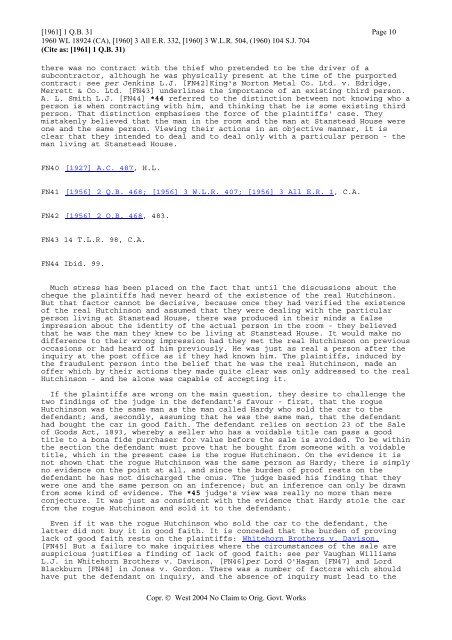Tesco v Constain - Thomson Reuters
Tesco v Constain - Thomson Reuters
Tesco v Constain - Thomson Reuters
You also want an ePaper? Increase the reach of your titles
YUMPU automatically turns print PDFs into web optimized ePapers that Google loves.
[1961] 1 Q.B. 31 Page 101960 WL 18924 (CA), [1960] 3 All E.R. 332, [1960] 3 W.L.R. 504, (1960) 104 S.J. 704(Cite as: [1961] 1 Q.B. 31)there was no contract with the thief who pretended to be the driver of asubcontractor, although he was physically present at the time of the purportedcontract: see per Jenkins L.J. [FN42]King's Norton Metal Co. Ltd. v. Edridge,Merrett & Co. Ltd. [FN43] underlines the importance of an existing third person.A. L. Smith L.J. [FN44] *44 referred to the distinction between not knowing who aperson is when contracting with him, and thinking that he is some existing thirdperson. That distinction emphasises the force of the plaintiffs' case. Theymistakenly believed that the man in the room and the man at Stanstead House wereone and the same person. Viewing their actions in an objective manner, it isclear that they intended to deal and to deal only with a particular person - theman living at Stanstead House.FN40 H[1927] A.C. 487, H.L.FN41 H[1956] 2 Q.B. 468; [1956] 3 W.L.R. 407; [1956] 3 All E.R. 1, C.A.FN42 H[1956] 2 Q.B. 468, 483.FN43 14 T.L.R. 98, C.A.FN44 Ibid. 99.Much stress has been placed on the fact that until the discussions about thecheque the plaintiffs had never heard of the existence of the real Hutchinson.But that factor cannot be decisive, because once they had verified the existenceof the real Hutchinson and assumed that they were dealing with the particularperson living at Stanstead House, there was produced in their minds a falseimpression about the identity of the actual person in the room - they believedthat he was the man they knew to be living at Stanstead House. It would make nodifference to their wrong impression had they met the real Hutchinson on previousoccasions or had heard of him previously. He was just as real a person after theinquiry at the post office as if they had known him. The plaintiffs, induced bythe fraudulent person into the belief that he was the real Hutchinson, made anoffer which by their actions they made quite clear was only addressed to the realHutchinson - and he alone was capable of accepting it.If the plaintiffs are wrong on the main question, they desire to challenge thetwo findings of the judge in the defendant's favour - first, that the rogueHutchinson was the same man as the man called Hardy who sold the car to thedefendant; and, secondly, assuming that he was the same man, that the defendanthad bought the car in good faith. The defendant relies on section 23 of the Saleof Goods Act, 1893, whereby a seller who has a voidable title can pass a goodtitle to a bona fide purchaser for value before the sale is avoided. To be withinthe section the defendant must prove that he bought from someone with a voidabletitle, which in the present case is the rogue Hutchinson. On the evidence it isnot shown that the rogue Hutchinson was the same person as Hardy; there is simplyno evidence on the point at all, and since the burden of proof rests on thedefendant he has not discharged the onus. The judge based his finding that theywere one and the same person on an inference; but an inference can only be drawnfrom some kind of evidence. The *45 judge's view was really no more than mereconjecture. It was just as consistent with the evidence that Hardy stole the carfrom the rogue Hutchinson and sold it to the defendant.Even if it was the rogue Hutchinson who sold the car to the defendant, thelatter did not buy it in good faith. It is conceded that the burden of provinglack of good faith rests on the plaintiffs: HWhitehorn Brothers v. Davison.[FN45] But a failure to make inquiries where the circumstances of the sale aresuspicious justifies a finding of lack of good faith: see per Vaughan WilliamsL.J. in Whitehorn Brothers v. Davison, [FN46]per Lord O'Hagan [FN47] and LordBlackburn [FN48] in Jones v. Gordon. There was a number of factors which shouldhave put the defendant on inquiry, and the absence of inquiry must lead to theCopr. © West 2004 No Claim to Orig. Govt. Works
















